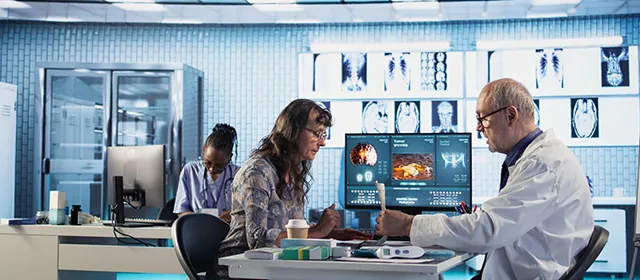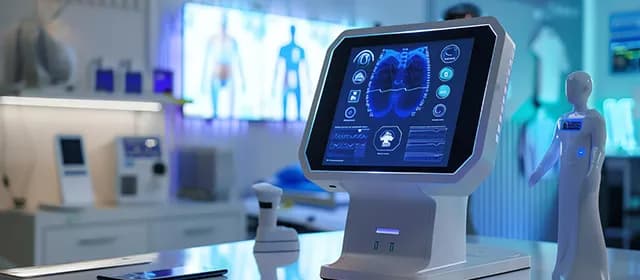Computer vision in healthcare is unlocking new possibilities in diagnostics, patient monitoring, and medical imaging. This technology enables machines to interpret visual data, assisting clinicians with faster and more accurate decision-making.
The computer vision in healthcare market is expanding due to growing demand for AI-assisted diagnostics, rising adoption of medical imaging technologies, and the need for improved patient outcomes. Hospitals and research institutions are leveraging computer vision for early disease detection, surgical assistance, and workflow automation.
Innovations in deep learning, imaging hardware, and data integration are further propelling growth. As healthcare continues to digitize, computer vision is set to play an increasingly vital role in modern medical systems. According to Kings Research, the global computer vision in healthcare market is projected to grow from USD 3,436.0 million in 2025 to USD 22,396.9 million by 2032.
10 Key Players in the Computer Vision in Healthcare Market
1. Siemens AG
Siemens AG, through its healthcare division Siemens Healthineers, actively develops and deploys computer vision and artificial intelligence technologies in medical imaging and diagnostics to support clinical efficiency and precision. The company’s innovative platforms, such as the SOMATOM Pro.Pulse CT, leverage deep learning algorithms and AI-based automation to deliver faster, more accurate imaging results. Siemens Healthineers’ Deep Resolve technology, for example, applies advanced computer vision directly to raw MRI data, significantly reducing scan times while enhancing image resolution and diagnostic confidence.
In February 2024, Siemens Healthineers launched the MAGNETOM Flow MRI system, featuring high levels of automation and AI integration to streamline complex workflows and improve consistency across different users and clinical settings. The system also incorporates sustainable features, such as Dry Cool technology, which minimizes helium usage and supports environmental responsibility. Siemens Healthineers continues to invest heavily in research and development, with a focus on AI, robotics, and advanced imaging, positioning itself at the forefront of the digital transformation in healthcare. The company’s solutions are widely adopted across hospitals and clinics worldwide, supporting a broad range of clinical applications and contributing to more informed, efficient patient care.
2. GE HealthCare
GE HealthCare is a major force in the computer vision in healthcare market, recognized for its commitment to integrating AI and advanced imaging technologies across its broad portfolio of medical devices. The company’s imaging systems including CT, MRI, and ultrasound utilize state-of-the-art computer vision and deep learning models to enhance image quality, automate anomaly detection, and support clinical decision-making. GE HealthCare’s digital platforms are designed to optimize radiology workflows, reduce manual intervention, and enable faster, more reliable diagnoses for healthcare providers.
In recent years, GE HealthCare has expanded its AI-driven offerings to support precision medicine and personalized care, aligning with the industry’s shift toward data-driven healthcare. The company collaborates with leading hospitals and research institutions to continuously improve its algorithms and deliver solutions that address real-world clinical challenges. With a global presence and a strong focus on innovation, GE HealthCare empowers clinicians to deliver better outcomes through smarter, more efficient imaging and diagnostic tools.
3. Koninklijke Philips N.V.
Koninklijke Philips N.V. is a leading player in the computer vision in healthcare market, that is driving advancements in computer vision to enhance diagnostic imaging, patient monitoring, and clinical workflows. Philips’ AI-powered imaging platforms, such as the IntelliSpace Portal and its latest spectral CT and MR systems, utilize sophisticated computer vision algorithms to deliver high-resolution images and actionable insights for clinicians. The company has pioneered the integration of deep learning into radiology, enabling automated detection of anomalies, improved image reconstruction, and faster, more accurate diagnoses. Philips’ solutions are designed to streamline workflows, reduce the burden on radiologists, and support precision medicine initiatives.
Philips is actively expanding its HealthSuite digital platform, connecting imaging devices, clinical data, and AI-powered analytics to enable collaborative care and continuous improvement in patient outcomes. With a strong global presence and partnerships across hospitals and research institutions, Philips continues to shape the future of computer vision in healthcare through innovation and a commitment to accessible, patient-centered care.
4. Canon Inc.
Canon Inc. has established itself as a significant innovator in the computer vision in healthcare market, leveraging its expertise in imaging and optical technologies. Canon Medical Systems, a subsidiary of Canon Inc., offers a comprehensive range of diagnostic imaging solutions, including advanced CT, MRI, and ultrasound systems that incorporate AI-driven computer vision capabilities. Canon’s proprietary algorithms enhance image clarity, automate the detection of clinical abnormalities, and assist radiologists in making faster, more accurate assessments. The company’s Aquilion series CT scanners and Vantage MRI systems are equipped with deep learning reconstruction technology, reducing noise and improving diagnostic confidence.
Canon is also investing in AI research collaborations to accelerate the development of next-generation computer vision tools for healthcare. Through continuous innovation and a focus on user-friendly, high-performance imaging solutions, Canon is helping healthcare providers deliver better patient outcomes and adapt to the evolving demands of modern medicine.
5. IBM
IBM is a pioneer in applying artificial intelligence and computer vision to healthcare, with a strong focus on medical imaging analytics, clinical decision support, and workflow automation. IBM’s Watson Health platform integrates computer vision algorithms to analyze medical images, extract clinically relevant information, and assist healthcare professionals in early disease detection and personalized treatment planning. The company’s AI-powered solutions are designed to interpret radiology images, identify patterns indicative of various conditions, and provide evidence-based recommendations to clinicians.
IBM collaborates with leading healthcare organizations and academic institutions to advance the capabilities of computer vision in areas such as oncology, cardiology, and neurology. By combining its expertise in cloud computing, data security, and AI, IBM enables scalable, interoperable solutions that support value-based care and improved patient experiences. As the healthcare industry increasingly adopts digital and AI-driven technologies, IBM remains at the forefront, driving innovation and transformation in computer vision applications.
6. NVIDIA Corporation
NVIDIA Corporation contributes to the growing use of computer vision in healthcare through its GPU platforms, supporting AI-based applications in medical imaging, diagnostics, and research. Leveraging its expertise in AI and accelerated computing, NVIDIA provides advanced GPU platforms and AI software frameworks that power a wide range of medical imaging and diagnostic applications. Solutions like the NVIDIA Clara platform enable hospitals and research institutions to deploy deep learning models for radiology, pathology, and genomics, facilitating faster and more accurate disease detection.
In recent years, NVIDIA has partnered with leading healthcare OEMs and cloud providers to integrate its GPUs into MRI, CT, and ultrasound systems, significantly enhancing image reconstruction, anomaly detection, and workflow automation. The company’s commitment to open-source AI tools and collaborative research has accelerated the development of next-generation computer vision algorithms, making NVIDIA a cornerstone of innovation in digital healthcare.
7. Intel Corporation
Intel Corporation is a key player in the computer vision in healthcare market, expanding its portfolio beyond CPUs to offer AI-optimized processors and accelerators for medical imaging and diagnostics. Intel’s OpenVINO toolkit and AI inference engines are widely used to deploy computer vision models across a variety of healthcare devices, from portable ultrasound scanners to large-scale radiology workstations.
The company’s data center GPU Max Series and Intel Xe architecture provide the computational power needed for real-time image analysis, 3D reconstruction, and automated anomaly detection. Intel collaborates with healthcare providers, medical device manufacturers, and software developers to create scalable solutions that improve diagnostic accuracy and patient outcomes. By focusing on heterogeneous computing and edge AI, Intel ensures that computer vision technologies are accessible, efficient, and secure in clinical environments worldwide.
8. Agfa-Gevaert Group
Agfa-Gevaert Group is a prominent provider of imaging and IT solutions for the healthcare sector, with a strong focus on integrating computer vision into clinical workflows. Through its Agfa HealthCare division, the company offers enterprise imaging platforms that utilize AI and computer vision to enhance the interpretation of X-rays, CT scans, and MRIs. Agfa’s intelligent workflow tools automate image analysis, flag potential abnormalities, and support radiologists with decision-making insights, leading to improved diagnostic speed and consistency. The company’s commitment to interoperability allows seamless integration with hospital information systems and electronic health records, ensuring that AI-powered insights are readily available at the point of care. Agfa-Gevaert’s continuous investment in research and partnerships with leading medical institutions position it as a trusted innovator in the evolution of computer vision in healthcare.
9. Fujifilm Group
Fujifilm Group is a prominent innovator in the computer vision in healthcare market, leveraging its decades of expertise in imaging technology to advance medical diagnostics and patient care. Through its healthcare subsidiary, Fujifilm Healthcare, the company offers a comprehensive suite of diagnostic imaging solutions including digital radiography, computed tomography (CT), and magnetic resonance imaging (MRI) that integrate advanced computer vision and AI algorithms. Fujifilm’s SYNAPSE platform, for example, utilizes deep learning to automate image analysis, support early disease detection, and streamline radiology workflows.
The company’s AI-powered tools are designed to enhance image clarity, reduce diagnostic errors, and assist clinicians in making faster, more confident decisions. Fujifilm is also at the forefront of developing cloud-based imaging and telemedicine solutions, enabling secure, real-time collaboration between healthcare professionals. With a global footprint and a strong commitment to research and development, Fujifilm Group continues to drive innovation in computer vision, improving diagnostic accuracy and efficiency across hospitals and clinics worldwide.
10. Aidoc
Aidoc is a leading provider of AI-powered computer vision solutions tailored specifically for medical imaging and radiology. The company’s advanced algorithms analyze CT, MRI, and X-ray images in real-time, automatically flagging critical findings such as intracranial hemorrhages, pulmonary embolisms, and other acute pathologies.
Aidoc’s platform seamlessly integrates with existing radiology workflows, providing clinicians with actionable insights and prioritizing urgent cases to accelerate diagnosis and treatment. The company’s solutions are FDA-cleared and CE-marked, reflecting a strong commitment to clinical validation and regulatory compliance.
In August 2024, Aidoc strengthened its presence in the computer vision in healthcare market through an enterprise-wide partnership with University Hospitals, a major healthcare system in Ohio, U.S. The deployment brings Aidoc’s AI-powered medical imaging platform to over 21 hospitals and 50 outpatient centers, enabling real-time analysis of CTs, MRIs, and X-rays across multiple care pathways. This large-scale implementation highlights the growing demand for computer vision solutions that enhance diagnostic accuracy, streamline radiology workflows, and support clinical decision-making at scale.
Conclusion
The computer vision in healthcare market is rapidly evolving as hospitals, research institutions, and technology companies push for faster, more precise, and more scalable diagnostic solutions. These top 10 companies are shaping the future of medical imaging and decision-making by embedding AI into core clinical workflows.
They are helping healthcare systems meet rising patient demands and reducing operational burdens by focusing on automation and accuracy. Continued innovation in deep learning, imaging hardware, and AI infrastructure will keep computer vision at the center of next-generation healthcare delivery.

.webp&w=3840&q=75&dpl=dpl_HkC6vhtovZ9gdp5f4CCyQszcdnYs)

